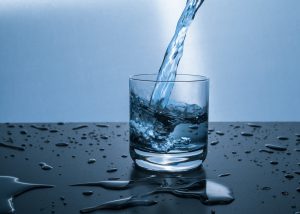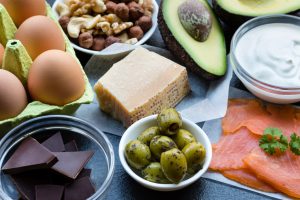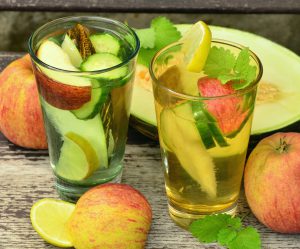There are some things that we know aren’t true. “Old wives’ tales” like eating bread crusts will make your hair curly, shaving will make your hair grow back thicker and darker, or making silly faces will result in a permanently silly face seem ridiculous to us now. But there are actually a lot of popular health myths still floating around out there, and many of us still believe them. In fact, more than 51% of Americans admit to believing in at least one health myth. After all, some of them just sound so logical! In addition, according to a recent study, the average American feels “perfectly healthy” less than half of the year, so it’s no wonder we’re willing to turn to any possible solution for better health. It’s important, though, to be able to tell the difference between fact and fiction, so read on for the real scoop on some popular health myths.

You NEED to Drink at Least 8 Glasses of Water a Day
This is probably one of the most commonly believed health myths out there. But there’s actually no science behind the need to drink a random amount of water per day; there isn’t even any scientific evidence that drinking more water improves skin appearance or makes your kidney work any better. This myth may have started with a 1945 Food and Nutrition Board recommendation that said that people need 2.5 liters of water a day, but even that 75-year-old advice came with the caveat that “Most of this quantity is contained in prepared foods.”
Your body is very good at telling you when you’re thirsty and will do so long before you’re dehydrated; if you’re drinking water when thirsty, eating a varied diet with fruits and vegetables, and even drinking tea and coffee, you’ll be plenty hydrated.
All Fat Is Bad
For years, the Dietary Guideline for Americans recommended a low-fat diet and we just can’t seem to shake our belief that fat is bad for us in multiple ways. However, it’s simply not true, and it’s time we got out of that 1990s way of thinking that a low-fat packaged cookie is better for us than nuts or avocado. Most of the myths about fat have been completely debunked, and we know that:
- Our bodies do need fat – even our brains are 60% fat!
- Fat does not raise blood glucose levels
- Not all fats raise cholesterol – monounsaturated and polyunsaturated fats don’t raise total cholesterol or LDL cholesterol (bad cholesterol). They can help to reduce LDL cholesterol and increase HDL (good cholesterol). Trans fats do raise cholesterol and should be avoided.
- Eating fat does not necessarily make you gain weight. In fact, research shows that people who eat a moderate or high-fat diet lose just as much weight or more than people who eat a low-fat diet (especially if they’re replacing healthy, higher fat foods with processed, high-calorie, or sugar-laden replacements). While it is true that fat has more calories per gram than protein or carbs, dietary fat doesn’t automatically convert to body fat. Not all calories are created equal, and excess calories from carbs and protein can also be converted to fat. Fat slows down digestion and helps you to feel more satisfied after a meal.
 Adding fats to your diet can actually be beneficial, as long as you add the right ones. Think about eating whole foods and including nuts, nut butter, seeds, fish, avocado, eggs, olives, and olive oil.
Adding fats to your diet can actually be beneficial, as long as you add the right ones. Think about eating whole foods and including nuts, nut butter, seeds, fish, avocado, eggs, olives, and olive oil.
Being Cold Gives You a Cold
Your grandmother always told you to bundle up, and scolded you for going out with wet hair, right? While she had your best interests at her, we hate to say that she didn’t really know what she was talking about. Being cold doesn’t actually give you a cold. One study has found that healthy men who spent several hours in temperatures just above freezing had an increase in healthy, virus-fighting activity in their immune systems. In fact, you’re more likely to get sick indoors, where germs are easily passed.
Breakfast Is the Most Important Meal of the Day

Do you know where that saying comes from? A 1917 article in Good Health magazine, which was edited by none other than Dr. J.H. Kellogg – yes, that Kellogg. In fact, most of our beliefs about how important breakfast is continue to come from studies funded by companies that make breakfast foods! Most independent, reputable studies point to the fact that breakfast isn’t more important than any other meal. Not only that, but many scientists are also beginning to agree that people who skip breakfast tend to eat fewer calories and weigh less (just ask any devoted follower of intermittent fasting!)
The problem with breakfast, at least in this country, is that the foods marketed as traditional breakfast foods tend to have more sugar in them than most desserts. So, if you’re a devoted breakfast eater, consider this the next time you’re choosing between a protein-filled egg dish, a cup of granola, or a fruity Greek yogurt cup: the latter two probably each have more sugar in them than a serving of ice cream or a store-bought mini pie.
Feed a Cold, Starve a Fever
Want to live like you’re in the Middle Ages? Then stick to the old “feed a cold, starve a fever” saying. All the way back then, people believed that there were two types of illnesses – those that lowered your body temperature, and those that raised them. The ones that raised them (fevers) needed to be starved to be deprived of energy. Now we know that all viruses need to be treated the same way: with rest, proper nutrition, and, most importantly, fluids.
Toilet Seats Can Make You Sick
We know, public restrooms are the worst. But don’t worry, it’s extremely unlikely that you’re going to catch anything from a toilet seat. Most germs, like viruses, can’t survive for long on the cold, hard surface of a toilet seat and sexually transmitted diseases need actual sexual contact to be passed along. What you do need to think twice about? Those faucets and door handles: the icky norovirus can survive on them for quite a while, so remember to always wash your hands!
“Detoxing” Is a Necessary Way to Jumpstart a Healthy Lifestyle
Do you know people who swear by doing some sort of “detox” or “cleanse” to get rid of “toxins” in their body? They fast, then stick to only juices or water spiked with cayenne pepper, and claim they are on their way to better health and/or weight loss. But there is no evidence that “detoxing” actually removes any of those undefined “toxins” from the body. As Edzard Ernst, emeritus professor of complementary medicine at Exeter University says, “The healthy body has kidneys, a liver, skin, even lungs that are detoxifying as we speak. There is no known way – certainly not through detox treatments – to make something that works perfectly well in a healthy body work better.” 
Unfortunately, detoxes are mostly hype and marketing. You might lose weight if you drink only water-based concoctions, but you’re bound to gain it back when you resume eating. And if you’re feeling better after your “detoxification”? It may be partly because a detox diet eliminates highly processed foods that have solid fats and added sugar. Simply avoiding these high-calorie, low-nutrition foods for a few days could make you feel a little better.
Health myths are tough to defeat, whether it’s because of marketing or the pure stubbornness of the human race. The best ways to combat misinformation? Keep yourself well-informed, and stick to the basics when it comes to your health: eat a varied diet of healthy foods, get plenty of sleep, take care of yourself when sick, and always wash your hands!

